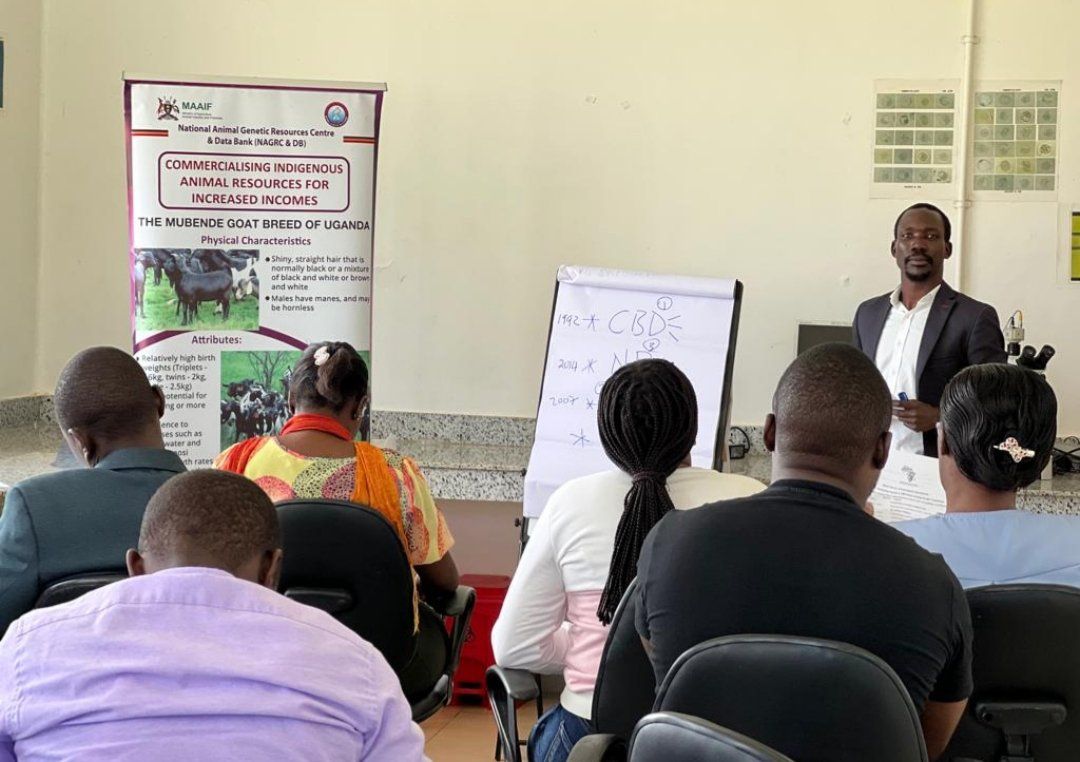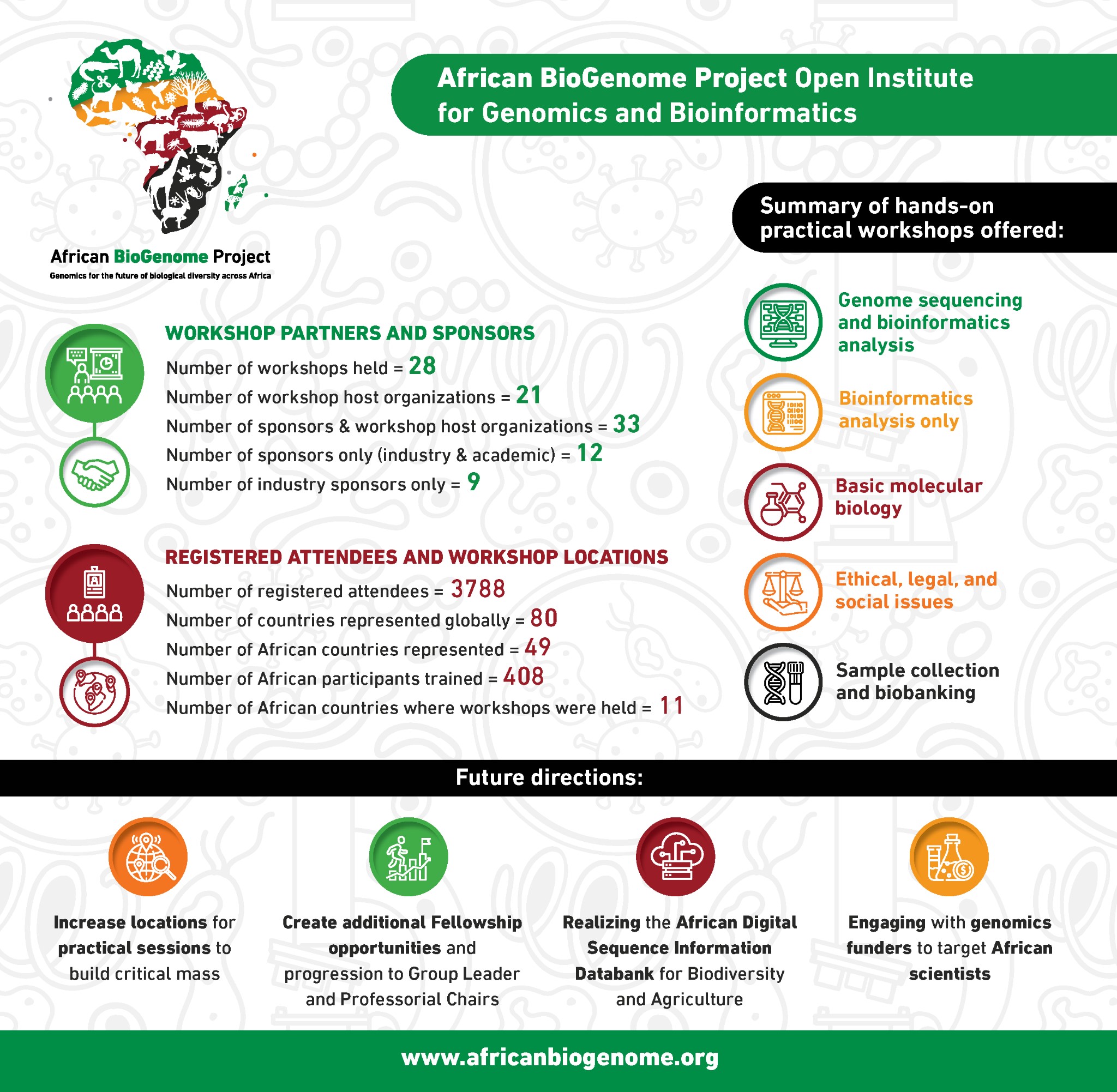
Establishing grassroots genomics and bioinformatics programs to train over 400 Africans yearly
The African BioGenome Project (AfricaBP) implemented a successful series of workshops in 2023 referred to as the Open Institute for Genomics and Bioinformatics Regional Workshops (Open Institute), as reported in Nature Genetics.
The AfricaBP Open Institute conducted 28 workshops on biodiversity genomics and bioinformatics across 11 African countries, covering 5 African geographical regions. The workshops attracted over 3700 registered participants, and of these, 408 scientists received hands-on training in molecular biology, genomics, and bioinformatics as well as ethical, legal, and social issues associated with acquiring genetic resources. Over 40% of the registered participants were female, supporting inclusive representation within the genomics and bioinformatics field. The Open Institute aligns with AfricaBP’s vision to harness the power of genomics for the improvement and sustainable use of biodiversity across Africa. The inaugural series of the regional workshops attracted African scientists, students, researchers, and industry professionals, from 49 African countries sponsored through public-private partnerships (PPP) involving 24 academic partners and 9 industry sponsors.
In December 2023, the National Animal Genetic Resources Centre and Data Bank (NAGRC&DB) in Uganda, joined the rest of the African scientists to take part in the open Institute East and Central African regional workshop 2023, the three-day practical session focused on how biological samples also commonly referred to as genetic resources can be ethically acquired from the owners. According to the experts, this can only be achieved by observing national, international, and global frameworks which demand that there should be an agreement between the provider and the user of genetic resources. There was emphasis that such agreements must spell out the purpose of acquiring the genetic materials and the need for equity; stressing that any benefits arising from the use (including development and commercialization) of the genetic materials be fairly and equitably shared with the provider.
NAGRC&DB was selected to host the regional workshop given the institute’s expertise and national mandate of conserving indigenous animal genetic resources both in-situ and ex-situ. The agency is also a regional centre of excellence hosting the African Union animal resources seed centre of excellence commonly referred to as Eastern Africa Regional Gene Bank.
Mr Joel Ogwang a geneticist at NAGRC&DB stressed the importance of adhering to the values of ethical acquisition of genetic resources. He said, “Early career researchers are not familiar with the nitty gritty of ethical clearance before sample acquisition, sometimes because the samples they use have already been acquired under a bigger project”.He further added that whether the genetic materials are for research or biobanking, it is important that they be acquired in a manner that is globally acceptable as provided for in the Nagoya Protocol to the Convention on Biological Diversity (CBD).
The work included several training sessions focusing on various aspects such as how to engage different stakeholders in the sample acquisition chain including obtaining relevant permits, preparing research and/or field collection documents, getting clearance from research ethical committees (RECs), registering research with the National Council of Science and Technology, among others. The workshop was attended by students under master degree programs and other professionals who are currently engaged in or plan to pursue projects that involve acquiring genetic resources such as semen, blood tissues, faecal matter for research, and biobanking. Mr. Abubakar Musoba, a Makerere University student who is currently characterizing ticks using molecular approaches commended the trainers and organizers of the workshop acknowledging that the training provided him with clarity as far as planning field sample collection is concerned.

Figure 1: Map showing African countries where 28 AfricaBP Open Institute regional workshops were held in 2023. Host countries are: Nigeria, South Africa, Morocco, Algeria, Egypt, Tunisia, Kenya, Cameroon, DR Congo, Ethiopia, and Uganda
“The AfricaBP Open Institute regional workshops held in 2023 were a resounding success. This is something that we in AfricaBP will build on, to ensure that we sustainably and deliberately build capacity in genomics and bioinformatics across the continent. Lessons learned will be used to continuously improve the curricula, to ensure that capacity is developed in critical areas. Using African institutions to hold the workshops has facilitated conversations with strategic leaders on their contributions to building institutional infrastructure. We envisage the continued impact of Africans building Africa, sustainably and continuously”, said Prof. Anne Muigai, Chair, AfricaBP, and Deputy Vice-Chancellor, National Defence University-Kenya.
The workshop has led to several outcomes directly impacting the future of genomics and bioinformatics across Africa including:
- Launch of the African Genome Center (AGC) – AfricaBP Open Institute Fellowship and the African Biodiversity Fellowship for Emerging Genomics Leaders in partnership with the African Genome Center in Morocco and the Carl R. Woese Institute for Genomic Biology at the University of Illinois Urbana-Champaign, United States, respectively.
- Bringing local genomics and bioinformatics to the mainstream.
- Integrating PPP with 9 industry sponsors to quickly mobilize resources, establish partnerships, and increase awareness for available technologies, products, and services.
- Removing language barriers by offering workshop courses in English and French, and potential for translating to local and regional languages such as Kikongo and Arabic, respectively, in the future.
- Establishing an African Digital Sequence Information Databank for Biodiversity and Agriculture
“Since its inception, AfricaBP has evolved to become a leading player in genomics and bioinformatics capacity building and capacity utilization in Africa. The 400+ scientists trained and further connected amongst peers to form a community of practice now carry the hope to support urgent efforts focused on addressing biodiversity challenges in Africa. Future resilience of our food systems rely on our ability today to capitalize on our rich biodiversity before more is lost. I am personally proud and humbled to have shaped and steered AfricaBP from its concept, design and inception”, says Prof. Appolinaire Djikeng, Co-Founder, AfricaBP, Director General, International Livestock Research Institute (ILRI), Senior Director, CGIAR Livestock-Based Systems, and Managing Director, CGIAR Resilient AgriFood Systems (RAFS)
The workshops covered genome sequencing and bioinformatics analysis, basic molecular biology; ethical, legal, and social issues; sample collection, and biobanking through hands-on and interactive practical sessions. The format and accessibility of the Open Institute have garnered much interest from participants and interested parties.

Figure 2: Highlights of AfricaBP Open Institute regional workshops 2023
“AfricaBP continues to show commitments to use existing resources and infrastructures across Africa involving academia, research institutions, and industry. In 2023 we demonstrated, and exemplified, the principles of PPP and how this could be deployed in genomics and bioinformatics to better target African researchers at scale. Future series of these regional workshops will be employed to exemplify solutions for specific genomics problems in the African context through, for example, hackathons”, said Dr. ThankGod Echezona Ebenezer, Founder & Co-Chair, African BioGenome Project, former Bioinformatician at the University of Cambridge, UK, and an Independent Consultant for the Wellcome Trust, UK.
The future direction of the Open Institute is as promising and ambitious as its start. The strategy for expanding the successful model will focus on increasing locations for practical sessions to scale the regional workshops, creating future fellowship opportunities as well as group leader and professional chair positions, and engaging with genomics funders to strategically mobilize resources to better target African scientists. The AfricaBP Open Institute is at the forefront of identifying and training the next generation of African scientists, including building and developing capacity on the continent. To continue this impactful and necessary work will require core funding and sustained investments from industry partners and science funding agencies. The Open Institute is yet another example of the exemplary future AfricaBP is laying for biodiversity genomics and bioinformatics in Africa through scientific collaborations and partnerships, providing a platform for innovations and policy change across the continent.
The AfricaBP is an affiliated project partner of the Earth BioGenome Project, Vertebrate Genomes Project, and the 10,000 Plants Genome Project.
Related links:
- Africa: sequence 100,000 species to safeguard biodiversity
- The Next Frontier for African Genomics – Safeguarding African Biodiversity
- Partnership to safeguard African biodiversity through genomics
- Accelerating knowledge exchange in biodiversity genomics and bioinformatics
AfricaBP Media team:
Fatu Badiane Markey, Ph.D.
Chair, Communication and Public Affairs Subcommittee
African BioGenome Project
Samuel Eziuzor
Co-Chair, Communication and Public Affairs Sub-committee
African BioGenome Project
Chukwuike Ebuzome
Co-Chair, Communication and Public Affairs Sub-committee
African BioGenome Project
